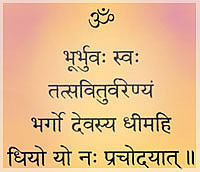Its a busy day today that I found this Gayatri Mantra. It was initially shared by a person I'm following on Facebook (whom I also met earlier when I bought an orgone from her). I played the music and I was instantly inspired. Drinking good tea and listening to the mantra is soothing for my soul. Its like band aid to my pains. So, I researched more about it and here is what I learned. (Trust me this wouldn't be as boring as copy paste from my sources).
In summary:
Origin: Hindu Sanskrit
What it is: a highly revered mantra originally recited only by males to invoke wisdom and intelligence from the Gods
The mantra in Sanskrit:

The mantra in Roman:
Aum
Bhuh Bhuvah Svah
Tat Savitur Varenyam
Bhargo Devasya Dheemahi
Dhiyo Yo nah Prachodayat
The video
Gayatri is actually the name for a Sanskrit poetical meter that contains three lines of eight syllables each. There are, therefore, many gayatri mantras, but this particular one is the oldest and most well known of all gayatri mantras. In Hinduism all Gods and Goddesses have a gayatri mantra associated with them. There is a gayatri for Ganesha, one for Shiva, one for Durga, one for Vishnu, one for Lakshmi, and so on. Most people are unaware of this fact and when Hindus talk about the gayatri mantra they mean thee gayatrimantra shown above, which is addressed to Savitri, the sun. The first line: om bhur bhuvah svah that you see above is not actually part of a gayatri mantra. It is a special utterance called vyahriti that has been added to the beginning of this famous gayatri . This vyahriti is important in and of itself and we will discuss it after we have explained the basic gayatri mantra. The three lines of this gayatri mantra are:
1. tat-savitur varenyam.
2. bhargo devasya dhimahi, and
3. dhiyo yo nah pracodayat
Here is a word-for-word breakdown of the gayatri mantra that most Hindus know.
tat–that (God)
savitur–of the sun
varenyam–the best
bhargo (bhargas)–light, illumination
devasya–divine
dhimahi–let us meditate (a verb)
dhiyo (dhiyah)–thought(s)
yo (yah)–which
nah–of us, our
pracodayat–May it push, inspire (a verb)
-- Source: http://www.sanskrit.org/www/Hindu%20Primer/gayatri.html
Meaning of the entire mantra
"O thou existence Absolute, Creator of the three dimensions, we contemplate upon thy divine light. May He stimulate our intellect and bestow upon us true knowledge."Or simply,
"O Divine mother, our hearts are filled with darkness. Please make this darkness distant from us and promote illumination within us."
-- Source: http://hinduism.about.com/od/prayersmantras/a/The-Gayatri-Mantra.htm
Meaning of the individual words
Om: The primeval sound
Bhur: the physical world
Bhuvah: the mental world
Suvah: the celestial, spiritual world
Thath: That; God; transcendental Paramatma
Savithur: the Sun, Creator, Preserver
Varenyam: most adorable, enchanting
Bhargo: luster, effulgence
Devasya: resplendent,supreme Lord
Dheemahi: we meditate upon
Dhiyo: the intellect,understanding
Yo: May this light
Nah: our
Prachodayath: enlighten,guide,inspire
-- Source: http://www.sathyasai.org/devotion/prayers/gayatri.html
